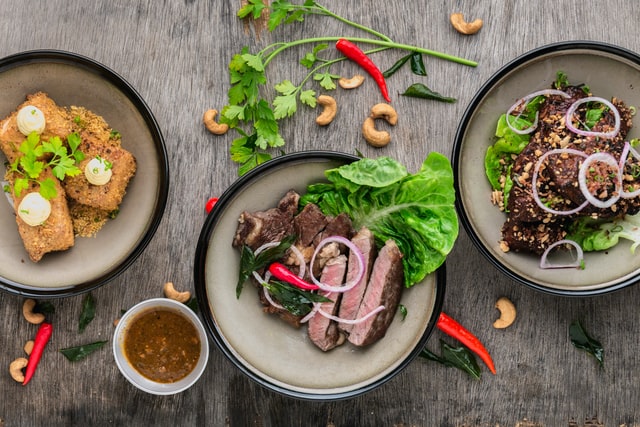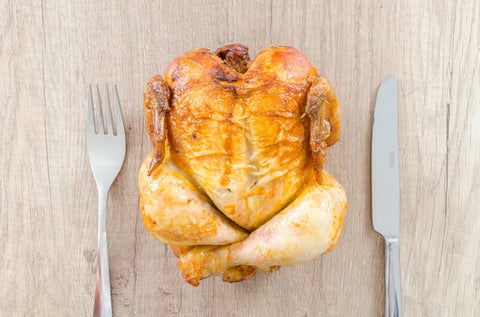
Common Mistakes to Avoid on a High-Protein Diet
The Spread
April 07, 2022
One of the best ways to lose weight or gain muscle is to eat more protein. Protein is a macronutrient that acts as a building block for muscles, blood, skin, and bones, among other things. Protein, in a word, is healthy for you. With the current trend of keto diets, many people have turned their attention toward proteins. The only problem is that some people don't know how to use them. And this can be an issue primarily because, as healthy as they might be in the right amounts, they can also be dangerous to your health if misused. As a result, we compiled a list of common mistakes to avoid on a high-protein diet. This list will be helpful if you want to improve your diet results and stay healthy. So without further ado, here is what you shouldn't do on a high-protein diet.
Eating the wrong proteins
Protein is protein, right? Wrong! Protein comes in many shapes and can be beneficial or not. For instance, even if all meat types contain protein, not all of them are just as good. Pork meat has a high concentration of saturated fats. Beef meat brings iron on top of the saturated fats. Salamis, sausages, and jerky have nitrates and sodium. And the list can go on.
As a result, choose your proteins with care and from lean sources. Chicken meat, salmon, eggs, kefir, yogurt, and legumes, are just some examples of good protein sources. Also, eating nuts can help you lose weight and limit your fat intake. Of course, no one says that you can’t have some bacon, for example, from time to time. Just make sure that you don’t fill your plate with it.

One of the mistakes to avoid on a high-protein diet is to eat high-fat proteins such as bacon too much and too often. Instead, eat less and combine it with other protein foods.
Eating exclusively protein
True, protein can work wonders, but not by itself. If you eat only protein, your body is deprived of other nutrients that it needs to function normally. For instance, your body also needs carbohydrates to stay healthy. Carbs are the primary source of fiber, antioxidants, and phytonutrients. Carbs also provide energy to your body, so they are essential if you exercise, practice sports, or are very active in the short-term or long-term.
Certain days might require more careful eating than others. For example, carrying boxes and moving furniture can put a strain on your body during a relocation. That is why, on a moving day, what you eat is important. You should eat your protein combined with vegetables and carbs for more energy. You can have salads and pasta, or make some nutritious sandwiches. In addition, don’t forget to have plenty of healthy snacks with you to keep your energy levels high.
Consuming all the protein in one meal
Another common mistake you should avoid making on a high-protein diet is having your protein intake in just one meal. For example, consuming a lot of protein in one sitting can harm your kidneys by forcing them to work harder than usual. And if that happens too often, you might end up with kidney dysfunctions. Instead, portion your proteins and eat them throughout the day. Breakfast can be oatmeal with peanuts or almonds, lunch can end with a banana split protein smoothie, and dinner can be a delight with some maple-flavored peanut butter spread. As you can see, you can spread your protein intake throughout the day and even make a pleasure out of it.

Don’t eat all your proteins in one sitting. That is a common mistake you should avoid on a high-protein diet. Spread your consumption in all the meals and even in your snacks representing mistakes to avoid on a high-protein diet.
Choosing processed food instead of whole food
Many people believe that certain foods are good for protein intake that, in fact, are quite processed. They eat a lot of burgers instead of grilled chicken, for example. At the same time, they have frozen meals, canned meat, hot dogs, processed cheese, and deli meat on their shopping list. Don’t get us wrong: some of these meals are high in protein, but they also include a lot of salt. Also, many products can be deep-fried, especially fast-food products. Therefore, if you want to have a healthy protein diet, avoid fast foods and processed foods. In addition, try to cook your meals at home as much as possible. There are plenty of recipes for inspiration just one click away.
Eating only meat as a protein source
As we mentioned earlier, protein comes in many different shapes. Yes, meat is the most common source of protein, but it is not the only one. And to demonstrate, we made a list of great sources of protein that you can use:
- Seafood - Shrimp, crab, lobster, mussel, clam, oyster
- Eggs
- Dairy - Greek yogurt, cottage cheese, milk, kefir
- Nuts (including spreads) and seeds - quinoa, pine nuts, almonds, peanuts, cashew, hazelnuts, macadamia, sesame, pumpkin seeds
- Legumes and beans - Peas, soy, lentils, chickpeas, and all other beans
- Grains - Wild rice, millet, couscous, oat, buckwheat, whole grain, corn, barley
- Spirulina
- Fruit - Blackberries, nectarines, guava, bananas, mulberry, avocado, Jackfruit, kiwi, grapefruit, cherries
- Vegetables - Brussel sprouts, broccoli, spinach, asparagus, artichokes, potatoes, sweet potatoes
As you can see, there are many choices available when looking for a protein source.

Nuts of all kinds can be a great source of protein and a tasty snack.
Overlooking the importance of hydration
If you are following a high-protein diet, one of the common mistakes you should avoid is not drinking enough of water. Such diets require a higher water intake to prevent health problems such as constipation. Furthermore, consuming a lot of protein fills your body with nitrogen, which your body discharges through fluids. As a result, try drinking as much as 64 ounces of water each day to stay healthy and strong.
Not exercising
Proteins and exercise go hand in hand. Proteins are required to exercise, and activity puts proteins to work. So, if you are looking to achieve muscle growth, for example, you can’t just eat protein. Instead, you need to exercise for around 150 minutes each week and do strength training at least twice a week. In addition, you need to drink even more water to keep your body hydrated.
Bottom line
A high-protein diet involves more than simply choosing what you eat. For instance, you need to know the foods that contain proteins to diversify your meals and that removing key food groups from your diet might have health consequences. In addition, you should avoid processed foods, drink plenty of water, and exercise weekly. So, if you want to have good results, keep this list of common mistakes to avoid on a high-protein diet in mind.